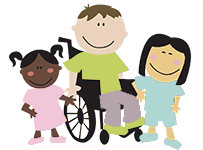While some children have typical articulation or sound errors, others can have a disorder known as childhood apraxia of speech. According to the American Speech-Language- Hearing Association, childhood apraxia of speech (CAS) is a motor speech disorder. Children with CAS have problems saying sounds, syllables, and words. This is not because of muscle weakness or paralysis. The brain has problems planning to move the body parts (e.g., lips, jaw, tongue) needed for speech. The child knows what he or she wants to say, but his/her brain has difficulty coordinating the muscle movements necessary to say those words.
Children with apraxia differ from children with traditional articulation impairments in the types of errors they exhibit and in the severity of their impairment. Children with apraxia also respond differently to speech treatment and thus should be accurately identified so they are able to make progress and become clear speakers.
Signs of Apraxia
- Children with apraxia will not exhibit all of these signs, but if your child is exhibiting several of them, you should have them evaluated for apraxia so the appropriate treatment for him/her can begin.
- Limited consonant repertoire
- Vowel errors or substitutions
- Voicing errors
- Initial and final consonant deletion, cluster reduction, syllable omissions, substitutions and distortions
- Substitutions more frequently perceived than other error types
- Errors higher for infrequently occurring words
- Errors on both imitative and spontaneous speech
- Inconsistent errors; same sounds not always in error
- Increase in errors with increased word length and sentence length
- Connected speech is more unintelligible
- Errors vary with the complexity of articulatory adjustment
- Groping or struggling to get word out
- Slow rate Prosodic disturbances
- Other “soft” neurological signs; clumsy, uncoordinated, poor body awareness
- May also have had limited vocalizations or sound play in infancy
- May also have had difficulty feeding in infancy
Treatment of Apraxia
Children with apraxia are able to make great gains once they are identified. A speech-language pathologist trained in working with children with apraxia of speech will work in a hierarchical approach moving the child from working on sounds in isolation to syllables, and onto words. Additionally, hand cues or visual cues can be used with children with apraxia to illustrate how sounds are made.

Comments (0)